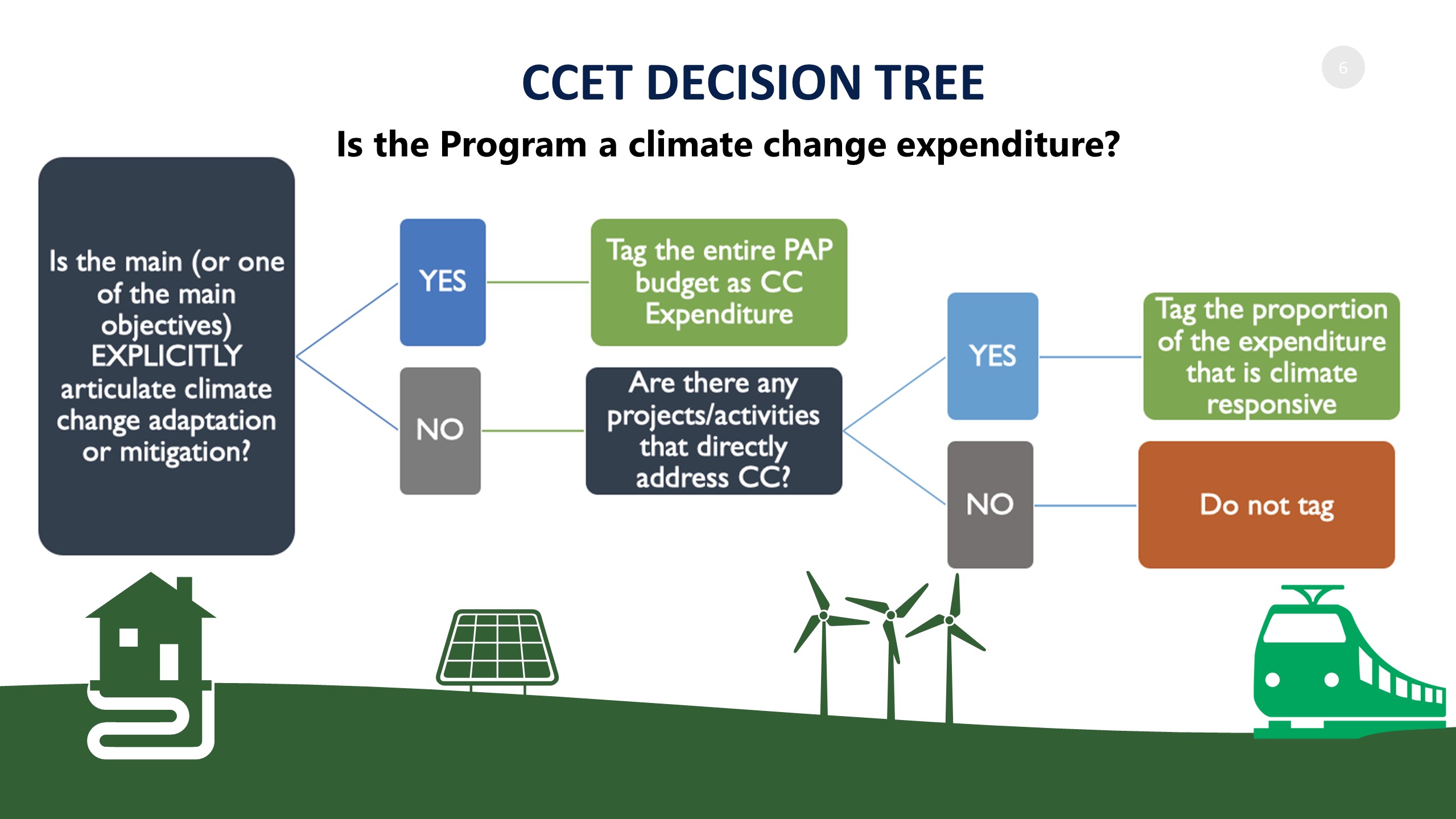
February 18, 2021 Thursday

Decision Tree represents the climate change expenditure tagging exercise for government institutions. Photo from the presentation of the CCC.
MANILA, 19 February 2021 — The Climate Change Commission (CCC) continues its virtual capacity building initiatives, this time on national climate change expenditure tagging (CCET) for Government Owned- and -Controlled Corporations (GOCCs) and State Universities and Colleges (SUCs). These are follow-up sessions to the virtual CCET orientation held by the CCC and the Department of Budget and Management (DBM) in April last year where some of the invited national government agencies, especially the SUCs and GOCCs, were not able to attend the orientation due to limited access to coordination and modes of communication during the first months of the quarantine.
“Since its inception in 2015, the CCET has proven to be instrumental in providing an avenue for national institutions to assess the alignment and scale of mobilization of public funds with our National Climate Change Action Plan and other national policies set to achieve our goals and aspirations for low-carbon, sustainable development felt by our communities down to the very last mile. Our urgent call is for the total share of climate change appropriations in our national budget to increase so it reflects that we have effectively baked in climate action, as a measure that cuts across all sectors,” said CCC Commissioner Rachel Herrera in her opening remarks during the two-day deep dive CCET session with GOCCs on February 10 and 11.
Over the course of five days, a total of 90 representatives from several GOCCs, and 300 representatives from 97 SUCs attended the session.
“The current pandemic has underscored the value of wise spending of resources to effectively address the needs of every Filipino. It also taught us how important it is for any government to look far beyond our horizon and prepare for any and all types of crises that may arise,” Herrera added.
DBM Assistant Secretary Rolando Toledo also welcomed the participants and emphasized the core strategy of adaptation in public finance.
“Under the 2021 General Appropriations Act, we have already tagged climate change expenditures amounting to Php282.4 billion, the bulk of which is focused on adaptation responses that would build the resilience of communities against the impacts of climate change,” Toledo said.
“As the Earth’s steward, we must take on quick steps to save our planet. The national government agencies, LGUs, GOCCs, are institutions that can effect change and must begin to collaborate to address the key issues. This virtual meeting is the first step in the battle against climate change…The Governance Commission enjoins the GOCC sector, and all institutions to support initiatives that help combat climate change. Let’s all double our efforts so that we may pass on a greener and healthier Earth for the next generations to come,” said Governance Commission for GOCCs Commissioner Marites Cruz-Doral.
The CCC and the Department of Budget and Management (DBM) led the institutionalization of CCET in 2013 through its Joint Memorandum Circular (JMC) 2013-01, which has been amended through DBM-CCC JMC 2015-01 to be consistent with the development of an outcome-based budgeting system.
Agencies and institutions are asked to track, tag, and analyze climate change-related expenditures to effectively mainstream climate action in the country’s domestic plans and programs and allow the allocation of public funds to implement projects and programs that would help communities adapt and cope with climate impacts, while also bringing benefits from reduced greenhouse gas emissions.
This initiative endeavored to strengthen the capacity of SUCs in mainstreaming climate change in their programs, activities, and projects using the CCET designated typologies on what are considered as climate adaptation or mitigation.
On the second session day for SUCs within the Visayas region, CCC Commissioner Noel Antonio Gaerlan delivered the opening remarks.
“CCET should go beyond to also address location-specific climate risks, based on the multi-hazard, multi-scenario and probabilistic approach. This is embodied in the policy issuance of the Commission,” he said. “It must present continuity in order for you to measure the effectivity and effectiveness of your strategies that is tagged in the respective climate budgets,” Gaerlan said.
These capacity building initiatives of the CCC and the DBM were conducted via virtual meeting platform, in accordance with the health and social-distancing guidelines released by the Inter-Agency Task Force on Emerging Infectious Diseases to prevent the spread of the COVID-19.